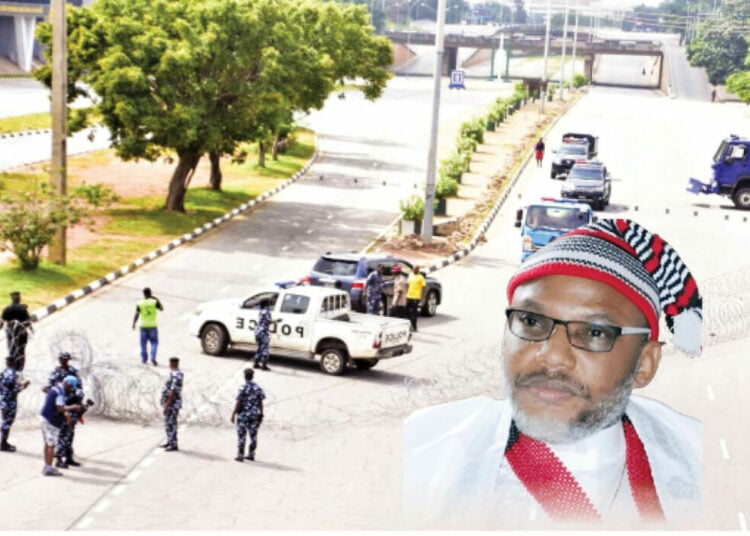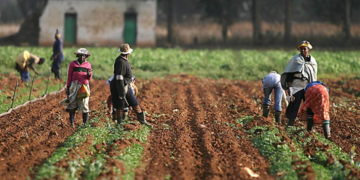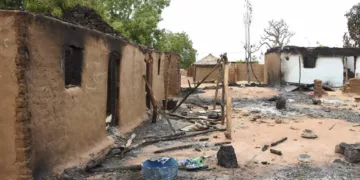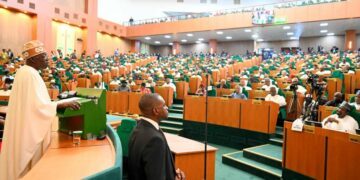Hours after Omoyele Sowore, a human rights activist and former presidential candidate, led protesters in parts of Abuja demanding the release of Nnamdi Kanu, the detained leader of the banned Indigenous Peoples of Biafra (IPOB), Kanu agreed to commence his defence.
The detained IPOB leader filed a motion of preliminary objection last Thursday, contesting the court’s jurisdiction to continue his trial. This objection was submitted on the same day that a team of medical experts appointed by the court submitted a report asserting that he was medically fit to stand trial.
In a fresh motion he personally filed on Tuesday, 21 October, Kanu informed the court that he was ready to begin his defence “pursuant to the order of this honourable court made on the 16th day of October 2015, directing the defendant to commence his defence on the 24th day of October 2025.”
In addressing the court presided over by Justice James Omotosho, Kanu outlined his intention to call 23 witnesses, divided into two categories.
He indicated that the first category would consist of “ordinary but material witnesses.” The second category, he noted, would comprise “vital and compellable” witnesses, who shall be “summoned under Section 232 of the Evidence Act, 2011.”
In the notice Kanu signed, he requested that, given the number of witnesses he intends to call, the court should consider granting 90 days to enable him to conclude his defence.
He assured the court that he would “testify on his own behalf, providing a sworn account of the facts, denying the allegations, and explaining the political context of his statements and actions.”
Among those Kanu listed as “compellable witnesses” are former Minister of Defence, General Theophilus Danjuma (rtd), former Chief of Army Staff, General Tukur Buratai (rtd), as well as Babajide Sanwo-Olu and Hope Uzodinma, Governors of Lagos and Imo States, respectively.
He also mentioned Nyesom Wike, the current Minister of the Federal Capital Territory Administration (FCTA), his Works counterpart, Dave Umahi, and Dr Okezie Ikpeazu, the immediate past governor of Abia State.
Additionally, he included the immediate past Minister of Justice, Abubakar Malami, SAN, the former Director General of the National Intelligence Agency, NIA, Ahmed Rufai Abubakar, his then-colleague at the State Security Service, SSS, Yusuf Magaji Bichi, and several witnesses whose identities he did not disclose.
In the notice, Kanu pledged to “provide the sworn statements of all voluntary witnesses to this honourable court, and to notify the prosecution within a reasonable time.”
He assured that “no precious time of the honourable court would be wasted,” emphasising that “it would be of interest to the honourable court and the general public that justice is not only done but manifestly seen to have been done.”
Kanu’s motion to open his defence coincided with a magistrates’ court in Abuja ordering the remand of his special counsel, Aloy Ejimakor, and 12 others protesting Kanu’s ongoing trial.
The police charged the 13 individuals with various offences, including criminal conspiracy, disobedience of a lawful order, inciting disturbance, and disturbing public peace, contravening sections 152, 114, and 113 of the Penal Code Law.
The 13 defendants named in two separate first information reports (FIRs) are Ejimakor, Kanu’s brother Emmanuel, Joshua Emmanuel, Wilson Anyalewechi, Okere Kingdom Nnamdi, Clinton Chimeneze, Gabriel Joshua, Isiaka Husseini, Onyekachi Ferdinand, Amadi Prince, Edison Ojisom, Godwill Obioma, and Chima Onuchukwu.
The magistrate, who stood down the case, later ordered that the defendants be remanded in Kuje Correctional Centre and adjourned the arraignment until 24 October.




